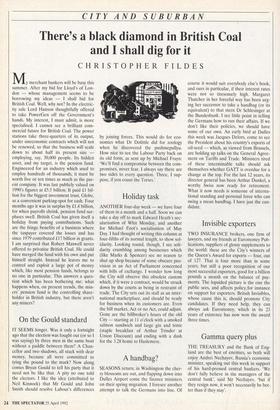CITY AND SUBURBAN
There's a black diamond in British Coal and I shall dig for it
CHRISTOPHER FILDES
My merchant bankers will be busy this summer. After my bid for Lloyd's of Lon- don — whose management seems to be borrowing my ideas — I shall bid for British Coal. Well, why not? In the electric- ity sale Lord Hanson thoughtfully offered to take PowerGen off the Government's hands. My interest, I must admit, is more specialised. I cannot see a brilliant com- mercial future for British Coal. The power stations take three-quarters of its output, under uneconomic contracts which will not be renewed, so that the business will scale down to about half its present size employing, say, 30,000 people. Its hidden asset, and my target, is the pension fund. Engineered for an industry which used to employ hundreds of thousands, it must be worth five or ten times as much as the par- ent company. It was last publicly valued on 1990's figures at £5.5 billion. It paid £1 bil- lion for the biggest investment trust, Globe, as a convenient parking-spot for cash. Four months ago it was in surplus by £1.4 billion, for when payrolls shrink, pension fund sur- pluses swell. British Coal has given itself a holiday from paying contributions. Such are the fringe benefits of a business where the taxpayer covered the losses and has since 1979 contributed £17 billion in grants. I am surprised that Robert Maxwell never offered to privatise British Coal. He could have merged the fund with his own and put himself straight. Instead he leaves me to control and exploit a large pot of money which, like most pension funds, belongs to no one in particular. This answers a ques- tion which has been bothering me: what happens when, on present trends, the min- ers' pension fund is the controlling share- holder in British industry, but there aren't any miners?


























































 Previous page
Previous page